|
EvEmu
0.8.4
11 September 2021
|
|
EvEmu
0.8.4
11 September 2021
|
#include "Scan.h"
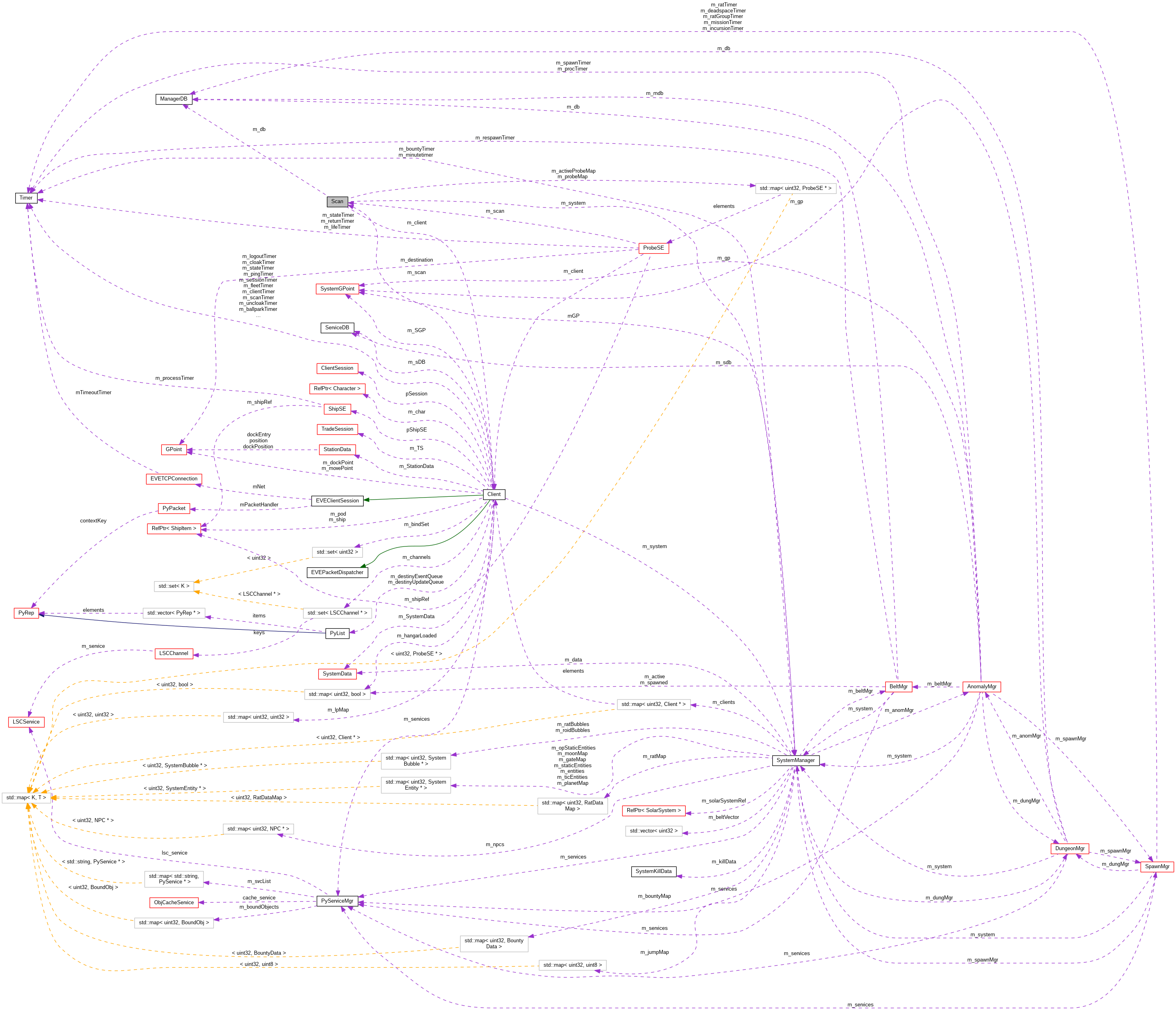
Public Member Functions | |
| ~Scan () | |
| uint8 | GetProbeCount () |
Private Attributes | |
| ManagerDB * | m_db |
| Client * | m_client |
| SystemManager * | m_system |
| bool | m_probeScan |
| std::map< uint32, ProbeSE * > | m_probeMap |
| std::map< uint32, ProbeSE * > | m_activeProbeMap |
Scan.cpp | |
Scanning methods for EVEmu : Allan
| |
| Scan (Client *pClient) | |
| void | ProcessScan (bool useProbe=false) |
| PyRep * | ConeScan (Call_ConeScan args) |
| void | RequestScans (PyDict *dict) |
| void | ShipScanResult () |
| void | ProbeScanResult () |
| void | SystemScanStarted (uint16 duration) |
| void | AddProbe (ProbeSE *pProbe) |
| void | RemoveProbe (ProbeSE *pProbe) |
| bool | GetProbeDataForSig (SignalData &data) |
| void | GetSignalData (SignalData &data, std::vector< ProbeSE * > &probeVec) |
| void | ScanStart () |
| void | SurveyScan () |
| void | CalcProbeAngles (GPoint &sigPos, std::vector< ProbeSE * > &probeVec, std::map< float, std::pair< ProbeSE *, ProbeSE * >> &angleMap) |
| Scan::Scan | ( | Client * | pClient | ) |
| void Scan::AddProbe | ( | ProbeSE * | pProbe | ) |
Definition at line 45 of file Scan.cpp.
References SystemEntity::GetID(), m_probeMap, and ProbeSE::SetScan().
Referenced by ActiveModule::LaunchProbe().


|
private |
Definition at line 681 of file Scan.cpp.
References _log, SystemEntity::GetID(), SystemEntity::GetPosition(), Ga::GaVec3::normalize(), and y().
Referenced by GetSignalData().


| PyRep * Scan::ConeScan | ( | Call_ConeScan | args | ) |
Definition at line 99 of file Scan.cpp.
References _log, SystemManager::DScan(), SystemEntity::GetPosition(), Client::GetShipSE(), m_client, Ga::GaVec3::normalize(), and Client::SystemMgr().

|
inline |
Definition at line 41 of file Scan.h.
References m_probeMap.
Referenced by ActiveModule::LaunchProbe().

| bool Scan::GetProbeDataForSig | ( | SignalData & | data | ) |
Definition at line 425 of file Scan.cpp.
References _log, PyList::AddItem(), Scanning::Group::DroneOrProbe, CosmicSignature::dungeonType, Dungeon::Type::Escalation, SystemManager::GetAnomMgr(), AnomalyMgr::GetScanGroupName(), GetSignalData(), m_activeProbeMap, m_system, Dungeon::Type::Mission, NULL_ORIGIN(), ONE_AU_IN_METERS, CosmicSignature::position, SignalData::probePos, SignalData::probes, Dungeon::Type::Rated, CosmicSignature::scanGroupID, PyTuple::SetItem(), Scanning::Group::Ship, SignalData::sig, CosmicSignature::sigName, Scanning::Group::Signature, Scanning::Group::Structure, Ga::GaVec3::x, Ga::GaVec3::y, and Ga::GaVec3::z.
Referenced by ProbeScanResult().


| void Scan::GetSignalData | ( | SignalData & | data, |
| std::vector< ProbeSE * > & | probeVec | ||
| ) |
Definition at line 580 of file Scan.cpp.
References _log, CalcProbeAngles(), SignalData::certainty, SignalData::deviation, EvE::max(), ONE_AU_IN_METERS, CosmicSignature::position, EvE::Trig::Rad2Deg(), SignalData::sig, CosmicSignature::sigID, CosmicSignature::sigName, CosmicSignature::sigStrength, Stat::sitesScanned, and sStatMgr.
Referenced by GetProbeDataForSig().
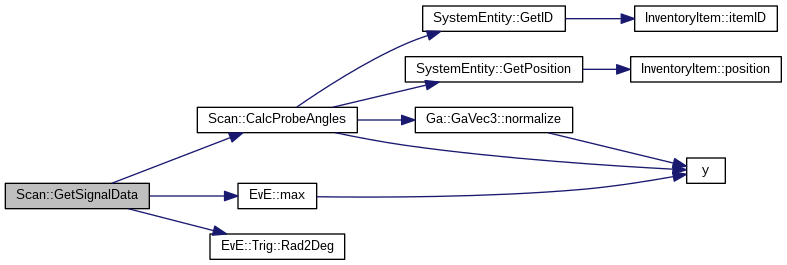

| void Scan::ProbeScanResult | ( | ) |
Definition at line 294 of file Scan.cpp.
References _log, SignalData::certainty, SignalData::deviation, PyRep::Dump(), AnomalyMgr::GetAnomalyList(), SystemManager::GetAnomMgr(), Client::GetName(), GetProbeDataForSig(), Client::GetShipID(), AnomalyMgr::GetSignatureList(), Client::GetSystemID(), m_activeProbeMap, m_client, m_system, NULL_ORIGIN(), CosmicSignature::position, SignalData::probePos, SignalData::probes, Client::SendNotification(), PyTuple::SetItem(), PyDict::SetItem(), SignalData::sig, Ga::GaVec3::x, Ga::GaVec3::y, and Ga::GaVec3::z.
Referenced by ProcessScan().
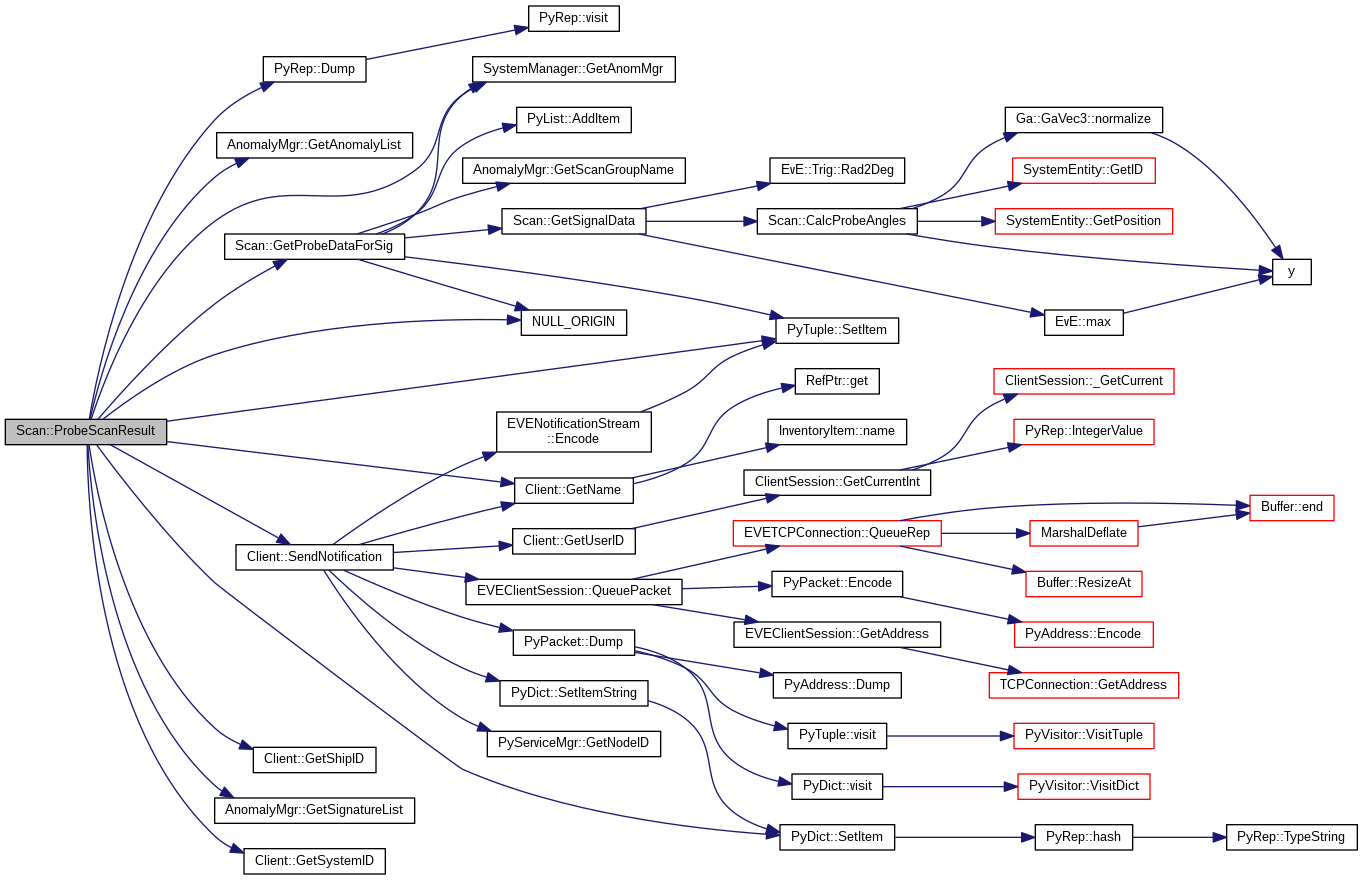

| void Scan::ProcessScan | ( | bool | useProbe = false | ) |
Definition at line 56 of file Scan.cpp.
References _log, AttrScanSpeed, EvilNumber::get_uint32(), InventoryItem::GetAttribute(), Client::GetShip(), Probe::State::Idle, m_activeProbeMap, m_client, m_probeMap, m_probeScan, ProbeScanResult(), Probe::State::Scanning, Client::SetScanTimer(), ShipScanResult(), and SystemScanStarted().
Referenced by Client::ProcessClient().
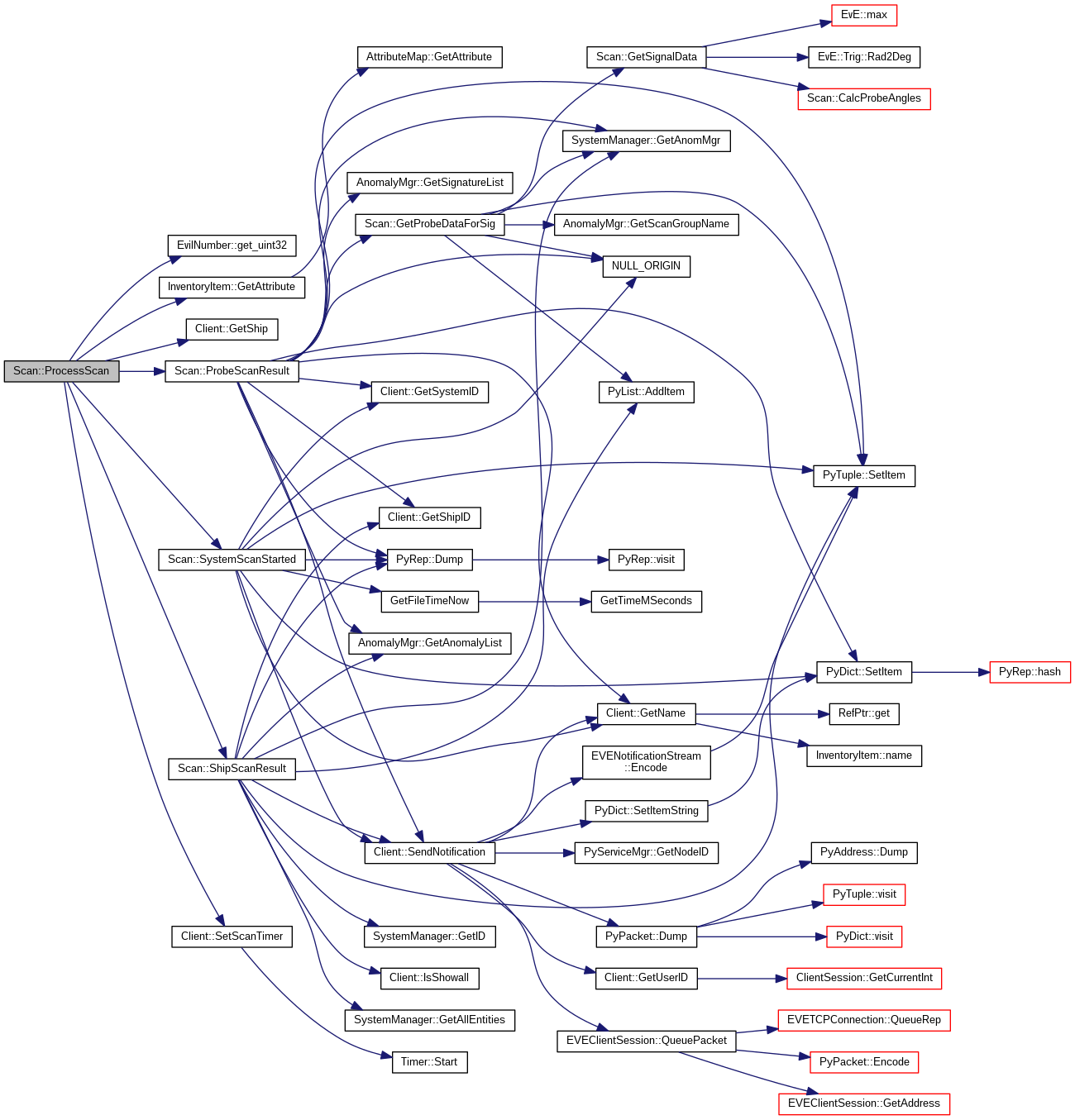

| void Scan::RemoveProbe | ( | ProbeSE * | pProbe | ) |
Definition at line 51 of file Scan.cpp.
References SystemEntity::GetID(), and m_probeMap.
Referenced by ProbeSE::RemoveProbe(), and ProbeSE::~ProbeSE().


| void Scan::RequestScans | ( | PyDict * | dict | ) |
Definition at line 139 of file Scan.cpp.
References _log, args, PyRep::AsFloat(), PyRep::AsTuple(), AttrScanSpeed, PyDict::begin(), ProbeData::dest, PyDict::empty(), PyDict::end(), ProbeData::expiry, EvilNumber::get_uint32(), InventoryItem::GetAttribute(), Client::GetCharacterID(), GetFileTimeNow(), PyTuple::GetItem(), Client::GetName(), Client::GetShip(), Client::GetSystemName(), PyObjectEx::header(), if(), Probe::State::Inactive, PyRep::IntegerValueU32(), m_activeProbeMap, m_client, m_probeMap, ProbeData::rangeStep, ProbeData::scanRange, Client::SendNotification(), Client::SetScanTimer(), PyDict::size(), ProbeData::state, PyFloat::value(), Ga::GaVec3::x, Ga::GaVec3::y, and Ga::GaVec3::z.
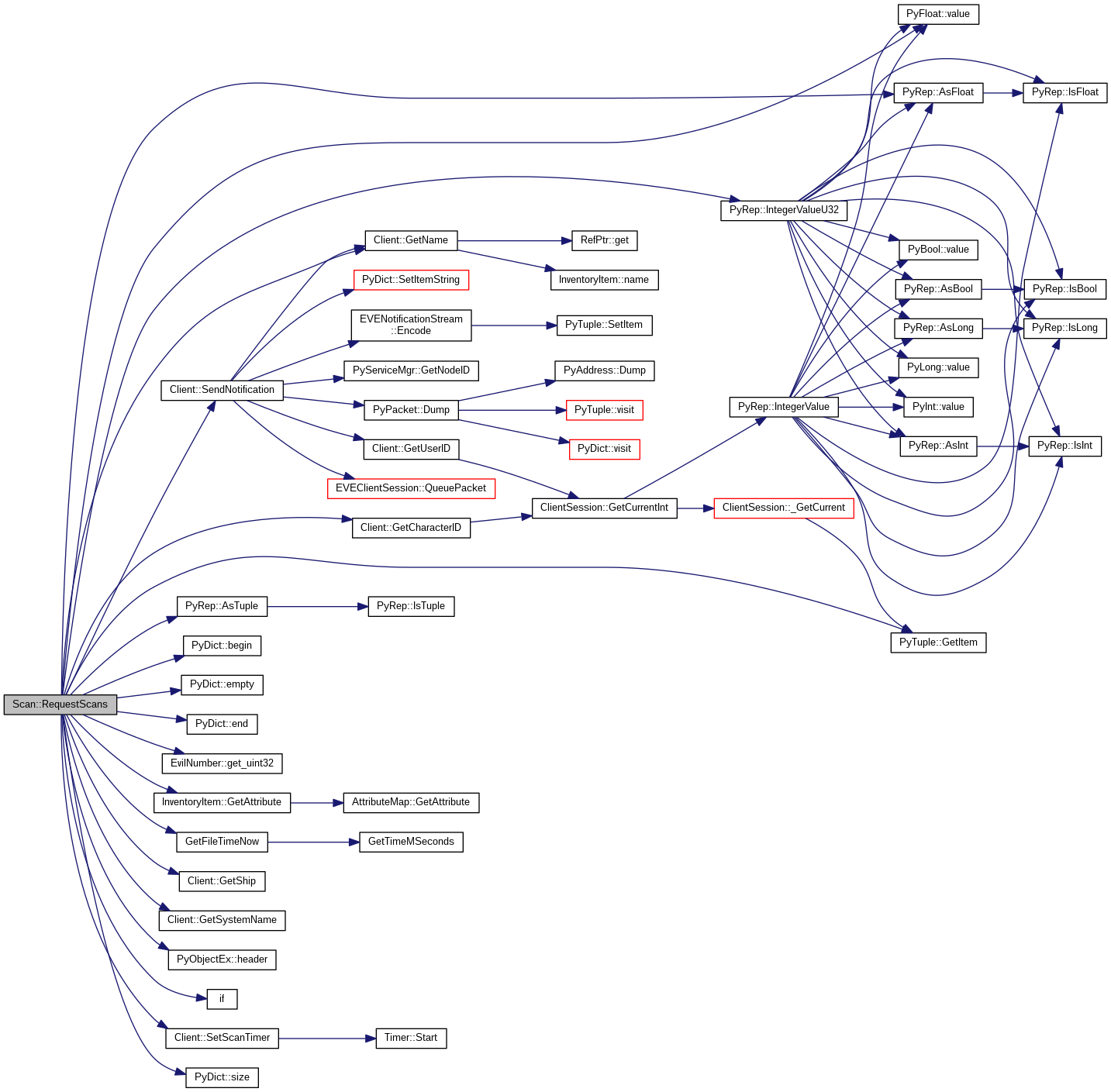
| void Scan::ShipScanResult | ( | ) |
Definition at line 245 of file Scan.cpp.
References PyList::AddItem(), PyRep::Dump(), SystemManager::GetAllEntities(), AnomalyMgr::GetAnomalyList(), SystemManager::GetAnomMgr(), SystemManager::GetID(), Client::GetShipID(), Client::IsShowall(), m_client, m_system, PyStatic, sBubbleMgr, Client::SendNotification(), and PyTuple::SetItem().
Referenced by ProcessScan().
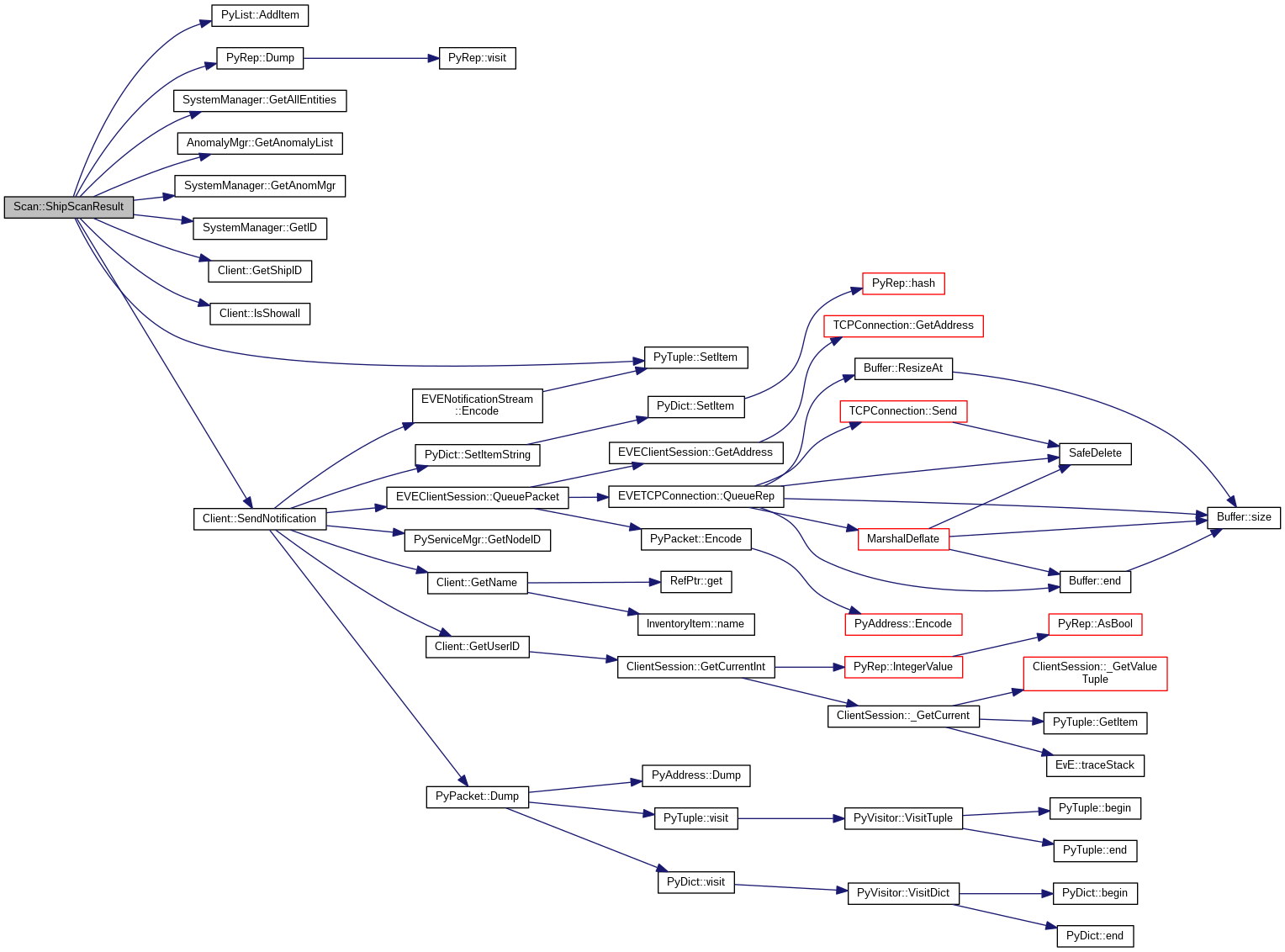

| void Scan::SystemScanStarted | ( | uint16 | duration | ) |
Definition at line 204 of file Scan.cpp.
References _log, PyRep::Dump(), GetFileTimeNow(), Client::GetName(), Client::GetSystemID(), m_activeProbeMap, m_client, NULL_ORIGIN(), PyIncRef, Client::SendNotification(), PyTuple::SetItem(), and PyDict::SetItem().
Referenced by ProcessScan().
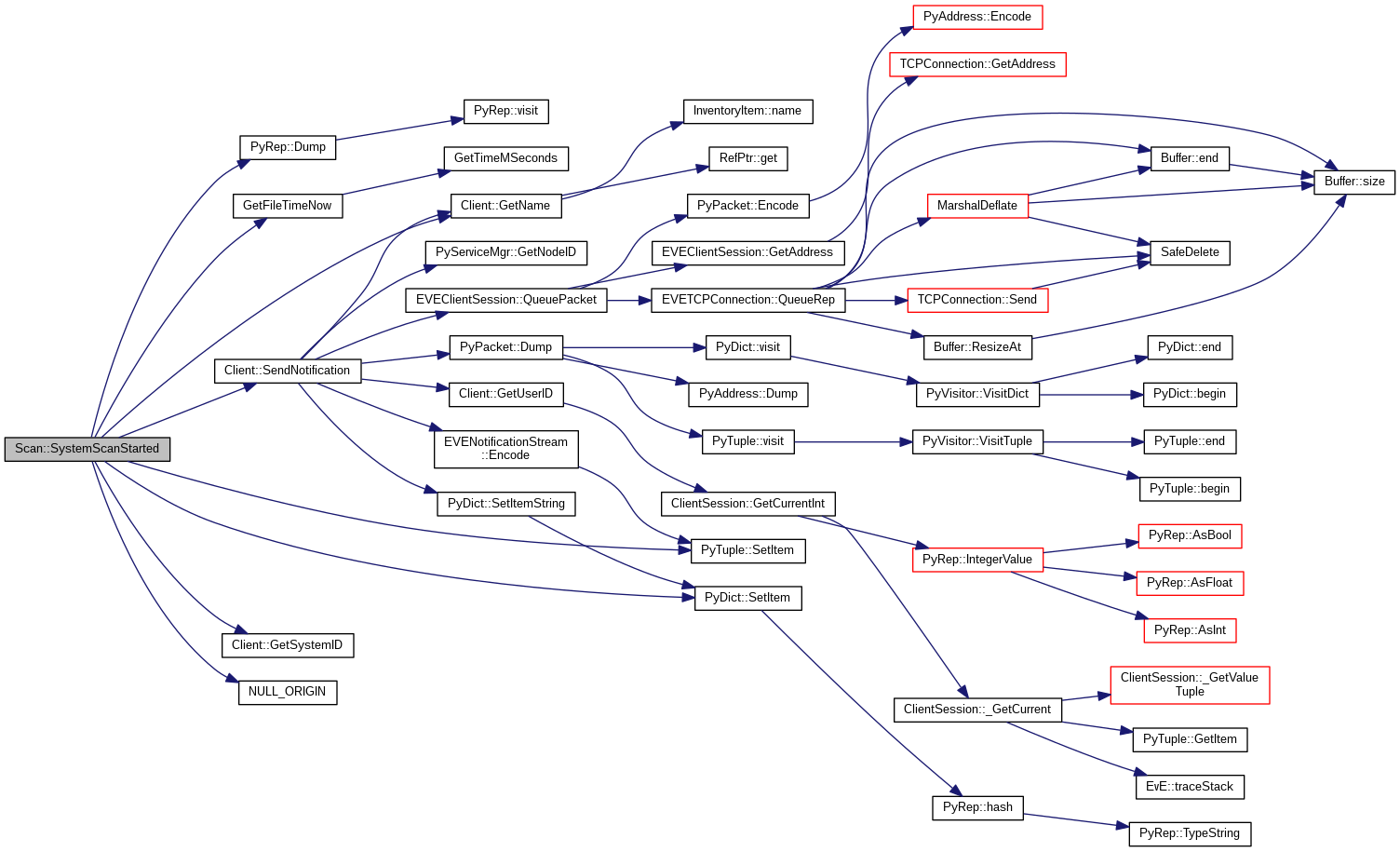

Definition at line 72 of file Scan.h.
Referenced by GetProbeDataForSig(), ProbeScanResult(), ProcessScan(), RequestScans(), Scan(), and SystemScanStarted().
|
private |
Definition at line 64 of file Scan.h.
Referenced by ConeScan(), ProbeScanResult(), ProcessScan(), RequestScans(), ShipScanResult(), and SystemScanStarted().
Definition at line 71 of file Scan.h.
Referenced by AddProbe(), GetProbeCount(), ProcessScan(), RemoveProbe(), RequestScans(), and Scan().
|
private |
Definition at line 69 of file Scan.h.
Referenced by ProcessScan(), and Scan().
|
private |
Definition at line 65 of file Scan.h.
Referenced by GetProbeDataForSig(), ProbeScanResult(), and ShipScanResult().